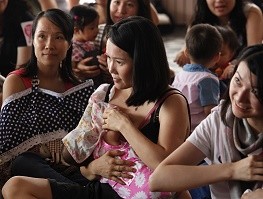The Chinese government is planning to raise the breastfeeding rate amid an amendment to the Advertisement Law proposing a ban on baby formula to promote breastfeeding in the country, the Global Times reported.
According to the draft bill, which was submitted to the National People's Congress Standing Committee, food advertisements that include dairy products and drinks that partly or fully substitute mother's milk are banned from mass media.
The proposed amendment further required that advertisers, agents, clients and publishers found to be violating the rule will be fined up to 1 million yuan ($163,260).
The report said that the government promotes breastfeeding as the ideal source of nutrition for infants as it boosts their immune systems and helps reduce chances of obesity in adulthood.
Research also showed that breast-fed children have higher IQs and are less likely to have chronic diseases such as diabetes.
The report, however, added that in China, only 28 percent of infants less than six months old were exclusively breastfed, as data released by the United Nations International Children's Emergency Fund (UNICEF) China in 2008 showed, which is lower than the 40-percent global average.
The government said that breastfeeding rates have increased in recent years due to some measures initiated to revive the practice, which include encouraging businesses to have dedicated rooms where new mothers can feed their infants.
According to a study by Australia's Curtin University together with Chinese colleagues, published in the International Breastfeeding Journal in 2009, breastfeeding rates in China started to drop during 1970s with the introduction of baby formula and hit a low in the '80s.




























